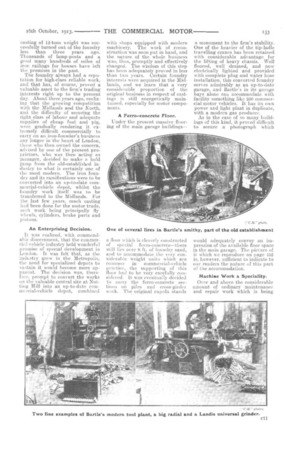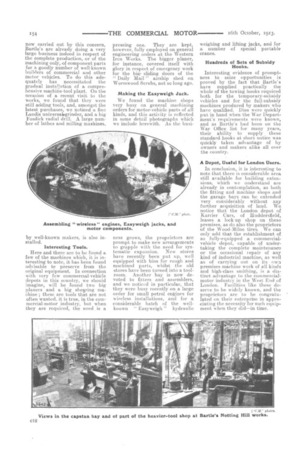Bartle' s West London Works.
Page 12

Page 13

Page 14

If you've noticed an error in this article please click here to report it so we can fix it.
The Interesting Story of an Iron Foundry which, Established in 1846, has now Been Converted into an Up-to-date Commercial-vehicle Depot with Fully-equipped Machine, Smith and Other Shops.
If it were possible for the original owner of the valuable site in Notting Hill, upon which the present establis.hment of James Bartle and Co. stands, to walk into the shops of to-day, it is safe to assume that he would be rudely shocked at the transformation which has been effected. In 1816 it was presumably a very paying proposition to establish an iron foundry, with smithy and heavy machinery equipment, in what was then an outlying district to the West of London. The facilities for the rapid securing of castings of all sorts, machined or in the rough, at low cost from -the actual districts where iron and coal were plentiful were not then available, as they are row.
Made Bridges and Erected Gasworks.
This foundry business of James Bartle and Co. flourished exceedingly for a number of years, and to this day one can be shown in the firm's offices records of many an interesting contract. carried out. successfully in the Lancaster Road works over half a century a.go. Their great speciality for years was the complete equipment of gasworks plant, including in a number of eases the gasometers. To this day many a gas works in the South of England regularly uses many of Bartle's specialities in connection cG with its gas-producing apparatus. Another feature of this interesting old foundry's walk was cast-iron bridges, numbers of which were erected over the Metropolitan canals ; one of the oldest is only just being replaced, we noticed recently, near La.dbroke ()rove. Castings up to 12 tons.
At one time the works kept 12 pair-horse vans busy delivering castings and collecting patterns to and from the South Coast, on account of freight troubles Nvith the railways. Some of the work was very heavy ; a hydraulic-press casting of 12-tons weight was successfully turned out of the foundry less than three years ago Thousands of lamp-posts and a good many hundreds of miles of iron railings for houses have left the premises in the past. The foundry always had a reputation for high-class reliable work, and that has, of course, proved a valuable asset. to the firm's trading interests right up to the present day. About three years ago, realizing that the growing competition with the Midlands and the North, and the difficulty of securing the right class of labour and adequate supplies of cheap fuel and pig, were gradually rendering it extremely difficult commercially to carry on an iron-founder's business any longer in the heart of Ldndon, those who then owned the concern, advised by one of the present proprietors, who was then acting as manager, decided to make a bold jump from the old-established industry to what is certainly one of the most modern. The iron foundry and its ramifications were to be converted into an up-to-date commercial-vehicle depot, whilst the foundry work itself was to be transferred to the Midlands. For the last. few years, much casting had been done for the motor trade, such work being principally flywheels, cylinders, brake parts and pislons.
An Enterprising Decision.
It was realized, with commendable discernment, that the commercial-vehicle industry held wonderful promise of special development in London. It was felt that, as the industry grew in the Metropolis, the need for specialized depots to sustain it would become more apparent. The decision was, therefore, prompt to convert the works tm the valuable central site at Notting Hill into an up-to-date coinin c rcial-vehicle depot, combined with shops equipped with modern machinery. The work of reconstruction was so-on put in hand, and the nature of the whole business was, thus, promptly and effectively'. changed. The wisdom of this step has been adequately proved in less than two years. Certain foundry interesU were acquired in the Midlands, and we learn that a very considerable proportion of the original business in respect of castings is still energetically maintained, especially for motor components.
A Ferro-concrete Floor.
Under the present massive flooring of the main garage buildings- a floor which is cleverly constructed of special ferro-concrete—th ere still lies over 8 ft. of foundry sand, and to accommodate the very considerable weight units which_ are common in commercial-vehicle practice, the supporting of this floor had to be very carefully considered. It was eventually decided to carry the ferro-concrete sections on piles and cross-girder work. The original cupola stands a monument to the firm's stability. One of the heavier of the tip-ladle travelling cranes has been retained with considerable advantage for the lifting of heavy chassis. Well floored, well drained, and now electrically lighted and provided with complete plug and water hose installation, this converted foundry serves admirably as an up-to-date garage, and Bartle's in its garage bays alone can accommodate with facility something like 200 commercial-motor vehicles. It has its own power and light plant in duplicate, with a modern gas producer.
As in the ease of so many buildings of this kind, it proved difficult to secure a photograph which would adequately convey an impression of the available floor space in the main garage. The picture. of it which we reproduce on page 152 is, however, sufficient to indicate to our readers the nature of this part of the accommodation.
Machiae Work a Speciality.
Over and above the considerable amount of ordinary maintenance and repair work which is being now carried out by this concern, Bartle's are already doing a very large business indeed in respect of the complete production, or of the machining only, of component parts for a goodly number of well-known builders of commercial and other motor vehicles. To do this adequately has necessitated the gradual installation of a comprehensive machine-tool plant. On the occasion of a recent visit to the works, we found that they were still adding tools, and, amongst the latest purchases, we noticed a fine Landis universalfgrinder, and a big Fosdick radial drill. A large number of lathes and milling maaltines,
by well-known makers, is also
Interesting Tools.
Here and there are to be found a few of the machines which, it is interesting to note, it has been found advisable to preserve from the original equipment. In connection with very few commercial-vehicle depots in this country, we should imagine, will be found two big planers and a big sheving machine ; these are tools that are not often wanted, it is true, in the commercial-motor industry, but when they are required, the need is a
pressing one. They are kept, however, fully employed on general engineering orders at the Western Iron Works. The bigger planer, for instance, covered itself with glory in respect of emergency work for the big, sliding doors of the
" Daily Mail airship shed on Wormwood Scrubs, not so long ago.
Making the Easyweigh Jack.
We found the machine shops very busy on general machining orders for motor-vehicle parts of all kinds, and this activity is reflected in some detail photographs which we include herewith. As the busi
ness grows, the proprietors are prompt to make new arrangements to grapple with the need for systematic expansion. New stores have recently been put up, well equipped with bins for rough and machined parts, whilst the old stores have been turned into a toolroom. Another bay is now devoted to fitters and assemblers, and we noticed in particular, that they were busy recently on a large order for small petrol engines for wireless installations, and for a considerable batch of the wellknown " Easyweigh " hydraulic
weighing and lifting jacks, and for a number of special portable cranes.
Hundreds of Sets of Subsidy Hooks.
Interesting evidence of promptness to seize opportunities is proved by the fact that Bartle's have supplied practically the whole of the towing hooks required both for the temporary-subsidy vehicles and for the full-subsidy machines produced by makers who have qualified. Dies were quickly put in hand when the War Department's requirements were known, and as Bartle's had been on the War Office list for many years, their ability to supply these standard hooks at short notice was quickly taken advantage of by owners and makers alike all over the country.
A Depot, Useful for London Users.
In conclusion, it is interesting to note that there is considerable area still available for building extensions, which we understand are already in contemplation, as both the fitting and machine shops and the garage bays can be extended very considerably without any further acquisition of land. We notice that the London depot of Karrier Oars, of Huddersfield, leases a lock-up shop on these premises, as do also the proprietors of the Wood-Milne tires. We can only add that the establishment of so fully-equipped a commercialvehicle depot, capable of undertaking the complete maintenance or the occasional repair of any kind of industrial machine, as well as of carrying out on its own premises machine work of all kinds and high-class smithing, is a distinct advantage to the commercialmotor industry in the West End of London. Facilities like these deserve to be widely known, and the proprietors are to be congratulated on their enterprise in a.ppre'elating the necessity for such equip. rnent when they did—in time.




















